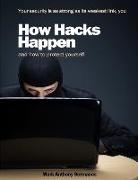- Start
- How Hacks Happen: and how to protect yourself
How Hacks Happen: and how to protect yourself
Angebote / Angebote:
Somebody hacks you online. You click a link should not have clicked. You look at the resulting web page without asking if it is legitimate. You type personal information and click OK. You inadvertently provide valuable information to a hacker. Maybe you have already experienced this.You find out after-the-fact. Here are the symptoms: You find unauthorized charges on your credit card bill. A bank account has been drained to zero or your balance is unexplainably low. You cannot access your files or your computer in general because all your files are encrypted, and someone is demanding a ransom payment. You receive letters from your bank because your checks are being returned as Insufficient Funds. Yes, you're bouncing checks. You apply for a loan and learn someone in another city used your credit to purchase a big-ticket item, such as a car, while leveraging your credit score. You receive notice from your insurer that someone has redeemed your benefits. Not you. You receive an annual notice from the Social Security Administration advising you of your entitlements. They are lower than last year. You still work. In How Hacks Happen and how to protect yourself, Mark Anthony Germanos and Brad Cracker show you how hackers think, work, and exploit. They present fake web pages and show you how to vet them. Germanos and Cracker share where your passwords spread and how to reclaim them. They explain how social media sites monetize your personal information and how to reduce the information you share. How Hacks Happen is for anybody who uses the Cloud and feels technology is "too much to handle." Let somebody else become the victim. You read How Hacks Happen and you are safe.
Folgt in ca. 15 Arbeitstagen




